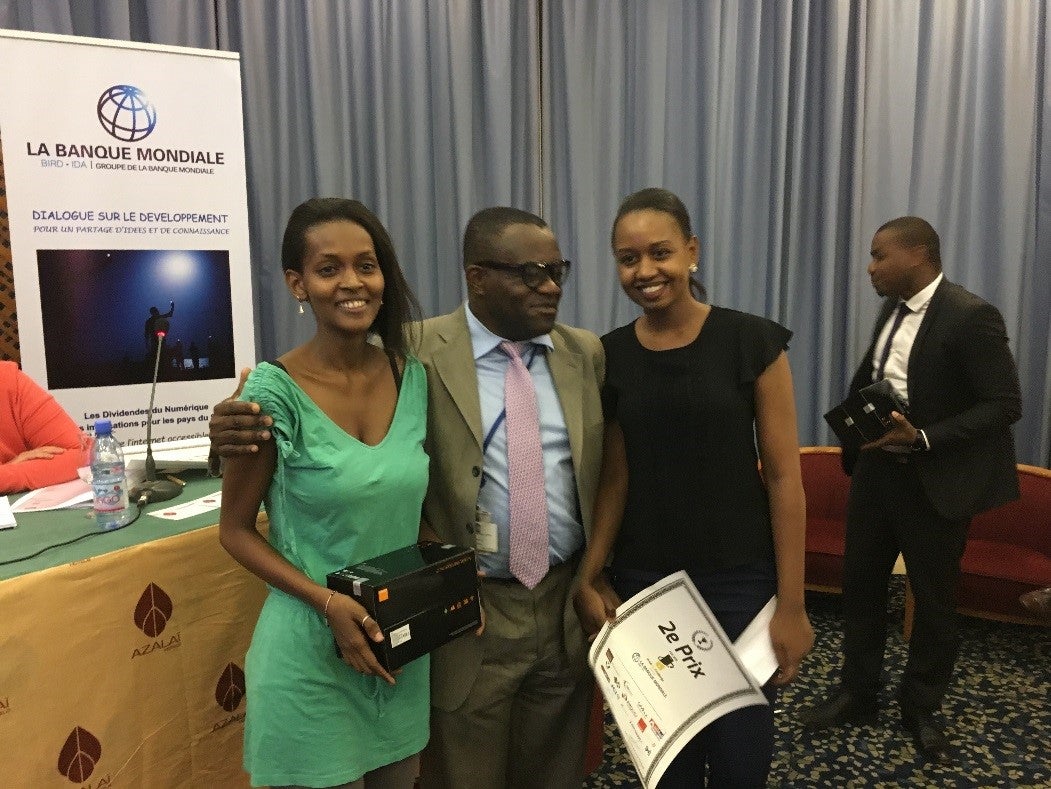 At the MaliAppChallenge, the major mobile applications competition organized in Bamako on May 9, 2016, Malian youth showed everyone that they are ready to participate fully in the country’s burgeoning digital revolution.
At the MaliAppChallenge, the major mobile applications competition organized in Bamako on May 9, 2016, Malian youth showed everyone that they are ready to participate fully in the country’s burgeoning digital revolution.
Despite the palpable and quite understandable tension, the eight finalist teams displayed keen enthusiasm when they presented their prototype applications to a panel composed of officials from Mali and the rest of the Sahel region and several players from the ICT community in Mali. These young people were fully engaged, well aware of what was at stake for the winning teams: smartphones and tablets, incubation opportunities, internships, training… In a nutshell, they would have the tools needed to become digital entrepreneurs and resources that are typically very difficult to mobilize.
These entrepreneurial projects are not only a first step in tackling high youth unemployment in the country. Each of these demonstrations showed that these applications had the potential to be truly transformational in either the agriculture, health, or education sectors. Two of the teams opted to focus on education, with each winning one of the four prizes on offer:
- The second prize was awarded for the Univ Kibaru application, which seeks to facilitate communication between universities and students, on matters such as timetable changes and academic scholarship opportunities;

congratulates the second prize winners on their Univ Kibaru application.
Source: MaliAppChallenge
Six months earlier, when we had begun discussions on the concept for this competition, we drew on the example in Mauritania, where a similar competition had been organized in 2015 and proved a resounding success. The level of development of the local mobile applications ecosystem was, however, a major unknown factor. In a country such as Mali, where the Internet is still beyond the reach of a large segment of the population and where few resources are allocated to technical training, bringing together a community of young developers and entrepreneurs around the same project did not initially appear to be an easy task.
However, organizing this competition delivered pleasant surprise after pleasant surprise, from concept preparation right up to the final, which was held in Bamako on May 9, 2016.
Right from the preparation phase, a wide range of sector stakeholders coalesced around this project in an amazingly collaborative spirit: the incubators from Bamako (Impact Hub Bamako and Createam) joined forces to organize the event and training for the candidates, and were supported by the developer communities and educational institutions, private sector players (IT enterprises, operators, etc.), and the authorities.
Then the selection phase, during which over 100 applications were received in a mere 10 days, convinced us that this type of event was addressing a real aspiration of large numbers of young people. Ten projects were shortlisted and selected for the final. It should nonetheless be borne in mind that there is a large pool of young entrepreneurs in Mali who are simply seeking encouragement and support for the successful implementation of their projects.
The selected teams demonstrated remarkable passion and diligence throughout the technical and business training sessions organized during the month preceding the final. These teams worked tirelessly on projects adapted to the specific difficulties currently facing young people, as explained by Fadimata Wallet, whose team won the popular choice award for the Orient Key application: “ Our application seeks to address a real problem in Mali, because many young students are facing difficulties related to academic and career guidance. I am really happy that our project won the popular choice award, because this shows that our application made an impression.”
These examples prompt further discussion of the potential contribution of ICTs to the education sector in Mali. Countless examples from all over the world, albeit often on a modest scale, have long shown that ICTs provide an extraordinary opportunity for the education sector. Mali must seize this opportunity. In a country where the youth population is growing at a faster rate than the infrastructure facilities that this segment requires (school, libraries, etc.), the widespread dissemination of educational content in electronic format, the introduction of online courses, remote access to national and international digital resources—in a nutshell all e-education solutions—are addressing challenges that would otherwise become insurmountable over time.
Mali’s young people are simply seeking a little more support and encouragement to assume a full role in this revolution.
Links
http://www.banquemondiale.org/fr/news/feature/2016/05/12/young-entrepreneurs-tackling-development-challenges-with-technology-win-the-maliappchallenge
https://www.facebook.com/maliappchallenge/
http://maliappchallenge.com/


Join the Conversation